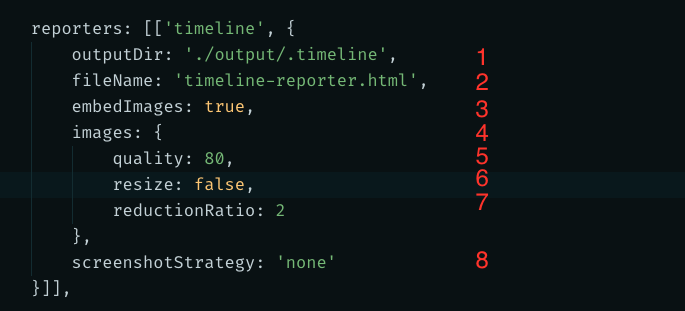A one stop shop WebdriverIO reporter for an aggregated visualisation of your test results because "Seeing is believing"
Because we spend a lot of time debugging failing tests switching from terminal output to viewing error screenshots etc. This reporter aggregates all the typical information you will need into one report. Run tests and have a nice timeline of events you can look back at to further verify everything looks ok.
- Works great with Mocha and Jasmine frameworks. Also works with Cucumber but every step will be reported as a test
- Loud Summary of the Test Results.
- Detail of each test run including all screenshots captured during test execution.
- Test Results filtering. Great for focusing on failed tests
- Error stack trace attached to test.
- Ability to add additional information to test at runtime.
- No post processing required. On completion of wdio test process, a static html report file will get generated.
- Timeline service to manage the taking of screenshots including resizing of the images.
An example html report can be found here
Instructions on how to install WebdriverIO can be found here.
FOR VERSION COMPATIBLE WITH WEBDRIVERIO V4 SEE HERE
npm install --save wdio-timeline-reporterA dependency will be added to your package.json
{
"dependencies": {
"wdio-timeline-reporter": "^5.1.0"
}
}Add timeline to the reporters array in your wdio config file.
Also import and add TimelineService from wdio-timeline-reporter.
Service is mandatory to combine reports and create html as reporters are now initialised per runner instance in webdriverio 5. See open discussion on webdriverio
The TimelineService can also manage taking of screenshots during tests execution. You have the option to reduce the size and quality of the images and to embed the images into the report as base64. These are configurable using the reporter options.
// wdio.conf.js
const { TimelineService } = require('wdio-timeline-reporter/timeline-service');
exports.config = {
// ...
reporters: [['timeline', { outputDir: './desired_location' }]],
// ...
services: [[TimelineService]]
};If you wish to override the default reporter configuration add a reporterOptions object literal to timeline array under reporters as shown below.
| index | description |
|---|---|
| 1. | Directory where html file and screenshots will be created in. Mandatory option |
| 2. | Name of report html file. Default value is timeline-report.html |
| 3. | Embed images as base64 in html file. Default value is false |
| 4. | Object options for image manipulation |
| 5. | Set JPEG quality. Only relevant if resize option is true. The smaller the value, the smaller image size and quality would be. Default value is 70. Max value allowed is 100 |
| 6. | Resize image. Default value is false |
| 7. | value to decrease the total number of pixels by. Only relevant if resize option is true. Defaults to 1 Valid values 1 - 5 |
| 8. | how often to take screenshots. Supported values are on:error, before:click, none. Defaults to none. before:click is a great option for creating a timeline of screenshots of app under test. |
It is possible to add additional information to a test using the addContext static method. This can be useful for adding important information that could help in debugging failed tests for example a user created during the test run with a dynamic username
The TimelineReporter.addContext static method accepts either a string parameter or an object literal with two properties title and value e.g
{ title: 'sessionId', value: 'b59bb9ec-ab15-475e-9ce6-de8a14ca0cd3' }value could be also be a link
const TimelineReporter = require('wdio-timeline-reporter').default;
describe('Suite', function() {
it('Test', function() {
// object literal parameter
TimelineReporter.addContext({
title: 'Test User',
value: 'user id created during the test'
});
// value as anchor tag
TimelineReporter.addContext({
title: 'Dynamic link',
value: '<a href="">Some important link related to test</a>'
});
// string parameter
TimelineReporter.addContext('This test might be flaky');
});
});Would love to give a shout out to the authors and maintainers of wdio-json-reporter Going through their v5 solution helped speed up my work


